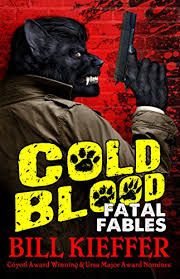Review by Thurston Howl
Bad things sometimes happen to good people.
As the cover of this hair-rising collection suggests, Cold Blood: Fatal Fables is a Noir-themed book of Bill Kieffer's furry novelettes set in Aesop's World. Now, for me, as a publisher, editor, and reader, I've read quite a lot of Kieffer's work over the years, from his horrifying novel The Goat to his short stories in a few THP works, to shorts he's posted on online archives. One might even go so far as to say I am quite the fan of Kieffer's work. Of course, I was eager to get my paws on his newest work, Cold Blood. However, I was ultimately a bit disappointed.
Before I get into critique, though, I want to talk about the layout of the book. We have six stories here. The first focuses on the gritty cop Shepard as he tries to rescue his son from a supernaturalist cult. There is a lot of genuine emotion at work here, and it is probably the most truly Noir of the stories. It makes me think of the popular supernatural Noir novel Falling Angel, and its subsequent film Angel Heart.
The next several stories track army veteran Brooklyn Blackie and his—as the back cover suggests—love of "sex and violence, no matter the species or gender." We start to get some fun mysteries from Blackie, but the plot kind of falls away for the sake of character development; that is, the author seems like he likes talking about the character interactions way more than he cares about the larger plot for Blackie. But, we do get a fun s/m story out of it, and it's gritty and cringy and all things erotic horror.
The finale of the book centers on a couple of rap stars in the middle of a gang war. The plot gets a bit of a revival here, and the characters start to flatten out.
The world of Aesop as presented in this book translates species into races comparable to the struggles we face in America today. The "Repts" (short for Reptiles really) are stand-ins for black people, their stories told predominantly through rappers and civil rights activists and riddled with crime, violence, and gangs. While the work does not promote any kind of racism whatsoever—and, in fact, condemns racism rather explicitly—the work does engage in an institutional racism and allows for that kind of thinking to be considered "non-racist" in that world.
There is further annoyance for me in the common trope of beginning race-writers of naming everyone based on a play off a color word. Thus, in this one book, we have characters named "Blackie," "Jewel Onyx," "Blanche," and even "Ivory." This not only made the characters blur together at a point, but also restricted characters to a kind of coloration that the plot tried to resist. In other words, the plot asks us to not judge characters by color, while the characterization begs us to.
The genre of the book became rather problematic for me as well. Yes, today, we are in the age of what is called the "blended genre," the ideal work that utilizes elements of multiple genres: horror, action, romance, adventure, etc. Most novels today implement the blended genre. However, that said, there is such a thing as trying to do too many things at once. Part of having a market/audience implies having readers that have certain expectations. It's great as an author to challenge and push those expectations, but it's another matter entirely to just crush those expectations. For most of this book, Kieffer does not present particularly high stakes for the detective work; very rarely do we feel any kind of suspense. Yet, the characters are pushed through this Noir plotline while Kieffer continues to throw fantasy elements at us. He throws sci fi elements at us. He tries to bring in Beat bisexual erotica. He brings in romance. But these genres don't blend. It's more like the genre changes every few pages to something else. I hesitate to even call the book Noir; rather, it has a Noir shell.
As usual for my reviews, I also want to pick on the product itself. The cover is just gorgeous. It sets up a clear genre expectation, and I know exactly what I'm getting. The back synopsis works out well too. The interior formatting, however, is shoddy, with super wide line spacing, running headers that align toward the center of the book instead of the edges, and lazy font selection. The editing too misses whole paragraph breaks, missing words, and misspelled words.
Now, even with all that said—much of it nitpicking, perhaps—I did enjoy reading this book. I do not think it is Kieffer's best work, but it is still a book worth reading. It does challenge traditional Noir through a progressive lens, advocating for some racial equality that was not kosher for old-time Noir. It is great to see bisexual characters in literature, period! And it is great to see kink-positive writers engaging in creative genres outside of strictly erotica. There is something in this book for any fan of literature. And, it's a very fast-paced read full of drama and action and memorable moments.
So I would recommend this book to any furry readers. Just read with a critical eye. Get Cold Blood, unless you've got cold feet.
